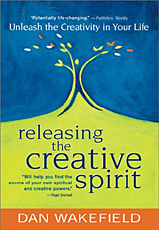"There are other simple techniques to experience the calming effect of silence. Singer Judy Collins told me, 'I use exercise and breathing to center and clear my head. I like to run and swim — those are the Western forms of Zen.'
"Running is one of the most popular contemporary ways of clearing the mind, and you don't have to be a marathon champion to have the experience. Oregon professor Robert Grudin tells in The Grace of Great Things: Creativity and Innovation how 'a long jog, with its strong rhythm and sense of physiological expressiveness' is one of the everyday methods he uses for clearing his mind when he's blocked or confused, and adds, 'Contrapuntal music works on me similarly, and sometimes a glance out of my office window, of the graceful Douglas firs that stand to the south, is enough to clear my head.'
"Swimming is the key practice for Constance H. Gemson, who took part in one of my Spiritual Autobiography workshops at the 92nd St. Y in New York. She published her first article in New York Newsday on her experience of swimming 'to find serenity.'
" 'Others may attend church or meditate,' Gemson wrote, 'but for me, swimming provides the peace and serenity I need.
" 'By swimming, I am creating and keeping the silence as I glide through the familiar water in a pool on West 86th Street in New York City. Each experience is the same, yet different. I go back and forth, back and forth, to finish this cycle sixty-six times, or a half a mile. . . . I swim three times a week in my search for a clearer, calmer life. . . .
" 'By swimming, I find my own rhythm and silence. In my crowded life, this is vital. In my secular city, I swim and I'm refreshed.'
"Kurt Vonnegut has suggested (in an introduction to a collection of stories by Budd Schulberg) that another Western form of meditation is simply reading short stories — in this process the pulse beat slows, the mind concentrates on the immediate word being read, the static of interior chitchat is turned off, and we experience the same benefits as those of the more rigorous exercises of 'pure' meditation emphasized by the Eastern traditions.
"When I started expounding the virtues I had found as a beginning yoga student to my old friend Ted 'The Horse' Steeg, a great athlete who was a 'little-All-American' (an athlete from a small-enrollment school) at Wabash College, and a champion in all town sports from softball to basketball in Woodstock, New York, he began to laugh. At first I thought he was trying to joke away my enthusiasm for living in the moment and shutting off the noise that the yoga postures provided. But that wasn't it.
" 'You yo-yo! Why do you think I've been playing sports all these years?' he challenged. 'That's what it does — puts you in the moment and shuts down the mental noise!'
" 'Oh, yeah — I guess it does,' I sheepishly admitted, healthily shedding some of my false guru-ship.
"Coach Phil Jackson affirms that 'What makes basketball so exhilarating is the joy of losing yourself completely in the dance.'
"Whatever the process — from swimming to playing basketball, reading short stories to centering prayer, Quaker meetings, Zen sitting, and Transcendental Meditation — the stilling and focusing of the mind empties you of distractions, puts you in the present, a phenomenon described by Annie Dillard in Pilgrim at Tinker Creek: 'Experiencing the present purely is being emptied and hollow; you catch grace as a man fills his cup under a waterfall.'
"By emptying, we are preparing ourselves to be filled."
